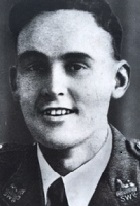(Please note that “context” is not an assessed element of this component of the WJEC GCSE in English Literature.)
Alun Lewis was born on 1 July 1915 in the small coal-mining village of Cwmaman, in Glamorgan. His parents, T.J. (Tom) and Gwladys Williams, were both English teachers. Although, as M. Wynn Thomas points out, he was ‘educated out of the working-class mining community of his native Cynon valley’, Lewis’s consciousness was shaped by the plight of the South Wales mining communities during the 1930s.[1] During his university years studying history at the University College of Wales, Aberystwyth, he was committed to the ideals of building prosperity through socialism and preserving world peace.[2] A dreamy young man, his early career was marked by a sense of inner conflict and uncertainty, but he never relinquished his vocation as a poet. After taking up a temporary teaching post at Lewis Boys’ School, Pengam, in 1940, Lewis enlisted with the Royal Engineers in London, and was sent to a Training Centre in Longmoore, Hampshire. He found life in the ranks cramped and frustrating, and baulked against the entrenched hierarchies of the English class system. His poetry, collected in Raider’s Dawn (1942) and Ha! Ha! Among the Trumpets (1945), offers an eloquent reflection on what it means to be a writer in a society at war.[3] Lewis met and fell in love with schoolteacher Gweno Ellis in 1939, and they married during a weekend of leave in 1941. Posted to India as a 2nd Lieutenant with the South Wales Borderers in October 1942, he was struck by the heat, the topography and the deprivation of the people around him. In the summer of 1943, while on leave in the Nilgiri hills, he met Freda Aykroyd, a writer and wife of a nutritional scientist, and their intense love affair inspired several of his poems.
Lewis died in Arakan, Burma (now Myanmar) on 5 March 1944. The cause of death was given as an accidental gunshot wound from his own weapon, and was possibly suicide. Welsh literature in English had lost one of its most singular, sensitive voices, when ‘a bullet stopped his song’.[4]
(A longer biography is available in the Library of Wales anthology Poetry 1900–2000,ed. Meic Stephens, pp. 173–4.)
[2] Greg Hill ‘Alun Lewis – the war, darkness and the search for poetic truth’, Critical Survey 2, 2/2 (1990), 216–222 (p. 216).
[3] Hill, ‘Alun Lewis’, p. 218.
[4] Alun Lewis, ‘All Day it Has Rained’, in Poetry 1900–2000, p. 176.






The poems in Ha! Ha! Among the Trumpets were written after autumn 1941, and mostly when Alun Lewis was on service in India. The inner, poetic journey traced by the collection parallels Lewis’s lived experience of leave-taking, his sea journey to India via Brazil, and life there as an officer. Many of Lewis’s poems and short stories draw on autobiographical elements, taken from the journals that he kept during his time as a soldier. John Pikoulis describes ‘Goodbye’ as a ‘poem of farewell to Gweno’[1]: it perhaps recalls their last night in a hotel together in Liverpool at the end of October 1942, before Lewis’s battalion set sail from the docks in the early morning. But it amalgamates any number of their snatched moments together in temporary accommodation during the war.
It is important to realise, however, that although this poem is anchored in lived experience, is should not be seen merely as a poetic record of Lewis’s individual story. As Cary Archard points out, he strived constantly to balance his personal, lyric vision with his social conscience.[2] The unnamed lovers in this poem, then, are also tragic actors in a more universal drama: their experience, as the poem makes clear, is both extraordinary and ordinary, shared by many others like them during World War II.
The seeming ordinariness of the occasion portrayed in this poem – the lovers ‘pack and fix on labels’, as if the soldier were going on holiday – is transfigured by the dignity of their affection and their celebration of intimacy. This interweaving of the romantic with the down-to-earth speaks of Lewis’s recognition that ‘the gap between realism and romanticism [had] changed and narrowed because of the war’:[3] everyday life had become heroic under the pressure of circumstances, and dreams were now essential to survival. However, traditional romantic gender roles are clouded and sometimes reversed in this poem: the speaker-soldier is imbued with fragility (signaled, for instance, by the patches on his uniform), while the lover he leaves behind shows strength in her will for life and continuity. His eyes are closed beneath her kisses, rendering him rather passive, yet hers remain wide open: she ‘stare[s]’. In a letter to Robert Graves, reprinted in Ha! Ha! Among the Trumpets, Lewis wrote, ‘I find myself quite unable to express at once the passion of Love, the coldness of Death (Death is cold), and the fire that beats against resignation, ‘acceptance’. Acceptance seems so spiritless, protest so vain. In between the two I live.’[4] This poem moves between unwilling acceptance in the face of intractable forces of history, and ‘the fire that beats against resignation’, that is also ‘the passion of Love’.
[1] John Pikoulis, Alun Lewis: a Life (Bridgend: Seren, 1991), p. 138.
[2] Cary Archard, ‘“Some Things you See in Detail, Those You Need”: Alun Lewis, Soldier and Poet’, in Wales at War: Critical Essays in Literature and Art, ed. Tony Curtis (Bridgend: Seren, 2007), pp. 75–92 (p. 84).
[3] Archard, ‘“Some Things You See in Detail”’, p. 82.
[4] From a letter quoted by Robert Graves in his introduction to Ha! Ha! Among The Trumpets (London, 1945).